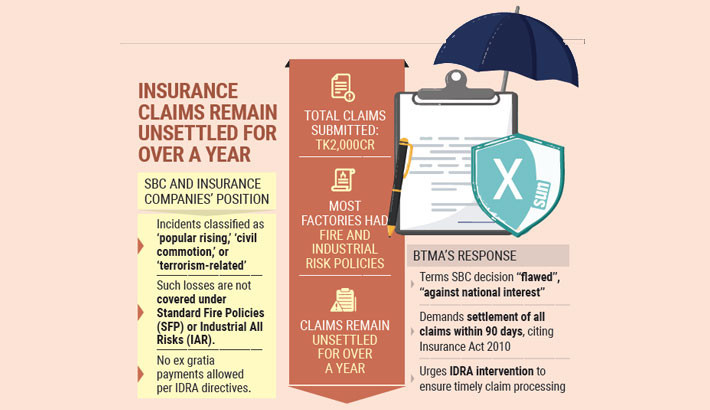02/28/2026

Tk2,000cr post-July Uprising insurance claims stalled
Shakhawat Hossain Sumon | Published: 2025-10-25 08:34:55

In July and August 2024, a historic mass movement of students and citizens led to the fall of the Awami League government. During this period, widespread violence resulted in significant loss of life.
At the same time — and in the aftermath of 5 August — numerous incidents of vandalism, looting, and arson occurred in the country’s major export-oriented ready-made garment (RMG) factories, warehouses, and other industrial facilities.
As a result, industrial entrepreneurs suffered heavy financial losses. Although most factories had paid insurance premiums covering fire and related risks, owners have yet to receive their insurance claims more than a year after the incidents. This delay has led to growing complications.
According to data from the Sadharan Bima Corporation (SBC), claims amounting to around Tk2,000 crore were submitted by various companies following the July–August 2024 unrest.
The SBC has stated that there is no legal basis for settling claims related to damages caused by a “mass uprising.”
However, leaders of the Bangladesh Textile Mills Association (BTMA) have accused the SBC of misinterpreting legal provisions to avoid paying the claims.
They have sought intervention from the government and the Insurance Development and Regulatory Authority (IDRA).
Insurance claims not covered
Recently, SBC held a meeting with chief executives and/or representatives of all non-life insurance companies and survey firms to discuss the insurance claims raised by affected factories and businesses.
During the meeting, SBC cited international reinsurers and defined the incidents as “popular rising,” “civil commotion,” and “terrorism-related damages,” concluding that such losses are not covered under Standard Fire Policies (SFP) or Industrial All Risks (IAR) policies.
Eastland Insurance CEO Mohammad Selim argued that whether an official declaration was made is irrelevant because a nationwide riot or civil commotion requires no declaration.
He emphasised that business considerations cannot override the policy’s terms and conditions.
Paramount Insurance’s Head of Claims, Imran Hasan, added that under IDRA’s directives, there is no scope for ex gratia payments. SBC’s decision must strictly follow the policy’s coverage terms, which all 45 insurance companies must comply with.
Bangladesh Insurance Surveyors Association President KM Morshed Alam noted that survey reports on the July–August incidents are still incomplete due to information gaps.
He suggested that IDRA, BIA, and the ministry should hold meetings with overseas reinsurers to provide clear directives for surveyors.
SBC General Manager Zakir Hossain stated that the July–August 2024 events should be classified as a popular rising or mass uprising, which are not covered under either SFP or IAR policies.
After discussions, the meeting concluded that claims related to these incidents would not be eligible for compensation.
BTMA’s letter seeking claim settlement
The BTMA has strongly criticised SBC’s decision as flawed and against the national interest, demanding its reversal. The association also called for the settlement of all claims within 90 days, as stipulated in the Insurance Act, 2010.
In a letter sent to Economic Adviser Salehuddin Ahmed in September, BTMA President Showkat Aziz Russell wrote that many member factories, warehouses, and installations suffered extensive damage during the unrest. Despite having insurance policies covering fire and related risks, most claims remain unsettled even after a year.
He mentioned that in a meeting held on 3 March, SBC and insurance companies dismissed the claims, labelling the incidents as part of a “mass uprising,” rendering them non-payable. This has left factory owners deeply frustrated.
The BTMA president urged IDRA to issue a circular directing all non-life insurance companies to prioritise these claims and ensure settlement within 90 days of receiving the required documentation, as per the Insurance Act.
BTMA Secretary General Brigadier General (Retd) Zakir Hossain said that the association raised the issue with the relevant ministry and regulatory authority following appeals from affected mill owners, but no satisfactory resolution has been reached yet.
He questioned whether SBC had the legal authority to interpret the incidents the way it did under the Insurance Act, 2010, and said the BTMA is closely monitoring the matter.
Scale of the losses
Following the July–August unrest, the Metropolitan Chamber of Commerce and Industry (MCCI) reported in September 2024 that the industrial sector had suffered an estimated Tk5,000 crore in damages.
MCCI CEO Faruque Ahmed said, “After the interim government took office last year, workers in various industrial areas began protests. Over a hundred factories were attacked nationwide, and more than two hundred were forced to shut down temporarily. The total damage to the industrial sector was around Tk5,000 crore.”
A private research organisation also reported in January 2025 that over 100 garment factories faced closure risks between August and January, while about 10 textile mills had already shut down. Between July and September 2024, 83 companies ceased operations entirely. The cement, steel, and paper industries also experienced shutdowns.
Commenting on the matter, IDRA Member (General Insurance) Mohammad Abu Bakar Siddique said the country’s non-life insurance policies do not cover the July uprising.
“The events are categorised under a popular rising and civil commotion, which are not included in standard insurance coverage,” he explained, adding that this has created legal and procedural complications.
Editor & Publisher : Md. Motiur Rahman
Pritam-Zaman Tower, Level 03, Suite No: 401/A, 37/2 Bir Protik Gazi Dastagir Road, Purana Palton, Dhaka-1000
Cell : (+88) 01706 666 716, (+88) 01711 145 898, Phone: +88 02-41051180-81